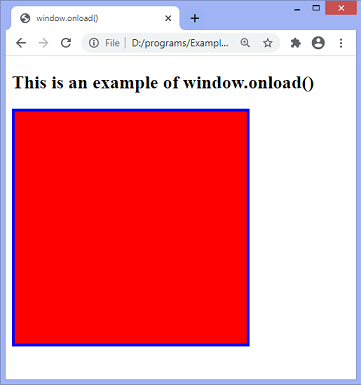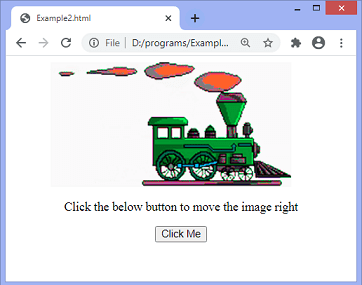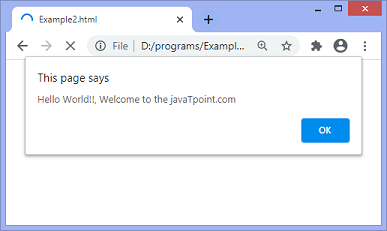JavaScript onload属性
在JavaScript中,此事件可以在页面完全显示后应用以启动特定函数。还可以用于验证访问者的浏览器类型和版本。我们可以通过使用 onload 属性来检查页面使用了哪些cookie。
在HTML中,当对象加载完成时,将触发onload属性。此属性的目的是在相关元素加载时执行脚本。
在 HTML 中,一般使用 onload 属性与 <body> 元素一起使用,以便在网页内容(包括CSS文件、图像、脚本等)完全加载后执行脚本。它不仅仅必须与 <body>标签 一起使用,还可以与其他HTML元素一起使用。
document.onload 和 window.onload 之间的区别是: document.onload 在图像和其他外部内容加载之前触发,它在 window.onload 之前触发。而 window.onload 在整个页面加载完成后触发(包括 CSS 文件、脚本文件、图像等)。
语法
window.onload = fun()
通过一些示例来理解这个事件。
示例1
在这个示例中,有一个高度为200px,宽度为200px的div元素。在这里,我们使用window.onload()来在网页加载完成后改变div元素的背景颜色、宽度和高度。
背景颜色被设置为’red’,宽度和高度分别被设置为300px。
<!DOCTYPE html>
<html>
<head>
<meta charset = " utf-8">
<title> window.onload() </title>
<style type = "text/css">
#bg{
width: 200px;
height: 200px;
border: 4px solid blue;
}
</style>
<script type = "text/javascript">
window.onload = function(){
document.getElementById("bg").style.backgroundColor = "red";
document.getElementById("bg").style.width = "300px";
document.getElementById("bg").style.height = "300px";
}
</script>
</head>
<body>
<h2> This is an example of window.onload() </h2>
<div id = "bg"></div>
</body>
</html>
输出
代码执行并加载页面后,输出如下 –

示例2
在这个示例中,我们通过使用DOM对象的属性和javascript的函数来实现一个简单的动画。我们使用 javascript 来调用 getElementById() 函数获取DOM对象,并将该对象赋值给一个全局变量。
<html>
<head>
<script type = "text/javascript">
var img = null;
function init(){
img = document.getElementById('myimg');
img.style.position = 'relative';
img.style.left = '50px';
}
function moveRight(){
img.style.left = parseInt(
img.style.left) + 100 + 'px';
}
window.onload = init;
</script>
</head>
<body>
<form>
<img id = "myimg" src = "train1.png" />
<center>
<p>Click the below button to move the image right</p>
<input type = "button" value = "Click Me" onclick = "moveRight();" />
</center>
</form>
</body>
</html>
输出
在上述代码成功执行后,输出将是 –

现在,我们来举一个示例,其中我们将使用HTML的 onload 属性和JavaScript函数。
示例3
这是一个简单的示例,展示如何使用HTML的 onload 属性与在JavaScript中定义的函数。在这个示例中,每当文档刷新时,将调用 alert() 函数。
<!DOCTYPE html>
<html>
<head>
<style>
</style>
<script>
function fun() {
alert("Hello World!!, Welcome to the javaTpoint.com");
}
</script>
</head>
<body onload = "fun()">
<h1> Example of the HTML onload attribute </h1>
<p> Try to refresh the document to see the effect. </p>
</body>
</html>
输出
执行上述代码后,输出结果如下:

 极客笔记
极客笔记